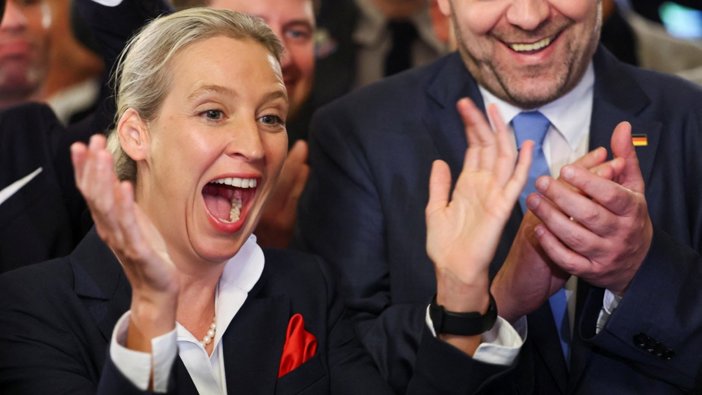
AfD Internal Clash Over Reintroducing Conscription
A deep schism is emerging in the AfD as its eastern and western factions clash over reviving military conscription.
Within Germany’s hard-right Alternative for Germany (AfD), a long-smoldering dispute over reactivating military conscription has flared into open contestation. Beneath the surface, the debate underscores a deeper struggle for influence between the party’s eastern and western wings.
Recently, the AfD’s federal committee on foreign and security policy convened in Erfurt and sparked internal uproar over a motion titled “Securing Germany’s Defense Capacity — Reactivating Conscription.” The proposal, submitted by defense spokesman Rüdiger Lucassen, reaffirms conscription as the party’s DNA and asserts that only through draft service can soldiers be “anchored to people and fatherland.” Meanwhile, prominent party figures publicly oppose or conditionally support it, exposing fractures along regional, generational, and strategic lines.
The Motion and the Backlash
Lucassen’s motion proposes introducing a draft once the Union or SPD reframe their voluntary service policies—doubling down on conscription as both a tactical and symbolic tool. He envisions pressuring the governing coalition into a patriotic posture, casting AfD as the uncompromising defender of national security.
However, when the motion spread to the eastern state associations, resistance brewed. Under the slogan “No conscription for foreign wars,” several eastern chapters demanded exclusion of conscripts from overseas operations. Thuringia’s Björn Höcke explicitly said he backs draft in principle—but “not now,” arguing that conscripts should never be sent into foreign conflicts. The newly amended motion draft includes the clause “Deployment of conscripts for foreign wars must be excluded.” But ambiguity about what “foreign wars” means keeps dissent alive.
The cleavage taps into latent tensions: is the AfD a party of ideological purity or pragmatic electoral positioning? Who calls the shots—the eastern power base or the western organizers?
Chrupalla vs. Weidel: Leadership Cleavages Exposed
The party’s two co-leaders, Tino Chrupalla and Alice Weidel, have issued contrasting signals. In a televised interview, Chrupalla declared himself currently against reintroducing conscription; Weidel immediately countered that it remains a central principle, as stated in the AfD’s platform.
Chrupalla’s base lies heavily in the former East Germany, where voters often favor a “peace party” posture. At a rally in Saxony, he reportedly exclaimed, “My sons you will not get!” — a populist line that resonated with many. In contrast, Weidel (from Baden-Württemberg) has shown a more outward-looking alignment: criticizing Russian overreach, referencing the Trump administration, and aiming to anchor the AfD in transatlantic conservative camp.
The divergence is not just semantic. Chrupalla’s regional roots grant him weight in the eastern associations; yet West German units—with more financial resources and administrative heft—now hold greater clout in Bundestag representation. The internal struggle over conscription becomes a proxy for the question: Who leads the AfD—East or West?
Electoral Context & Programmatic Maneuvering
The party faces pressures on multiple fronts. For example, during the drafting of its current federal election platform, some proposals to remove conscription from campaign messaging caused uproar. In 2024, the AfD’s platform committee temporarily dropped the demand, sparking backlash from its defense bloc.
Meanwhile, national polling suggests conscription is a polarizing issue—potentially alienating moderate conservatives while energizing hardline supporters. Some rank-and-file members see the motion as an opportunity to force the mainstream parties (CDU/CSU, SPD) to respond. Others worry it distracts from core issues like identity, immigration, and external alignment.
Regional Power and Bundestag Arithmetic
A key underlying shift is demographic: in the current Bundestag, fewer than 30% of AfD MPs hail from eastern federal states. The western associations thus command greater legislative muscle.
In private discussions, complaints circulate that eastern chapters receive disproportionate attention—averted by some as “voices from the Thüringer Forest” better left unheard. Such language betrays both frustration and factional strategy.
The conscription debate is thus more than policy—it’s a power struggle: who shapes AfD’s identity, especially on security and foreign affairs?
Where Things Likely Head
- A fractious parliamentary faction debate: The motion is expected to come up in an AfD parliamentary meeting soon. Internal maneuvers aim to block it or significantly dilute it before Bundestag introduction.
- Conditional adoption: If passed, it may come with caveats about deployment, timing, or exemptions—designed to avoid appearing intransigent.
- Symbol over substance: Regardless of enactment, the debate may serve more as branding than legislation. The AfD can use the motion to highlight contrast with mainstream parties.
- External posture pivot: The contest may tip the AfD’s foreign alignment more decisively—toward the U.S./Trump side (Weidel) or toward Russia and Sino-authoritarian sympathies (Höcke/Chrupalla axis).
Why is there opposition within a party that officially supports conscription?
Because regional voter attitudes differ. In the East, many AfD supporters prize stability and nonintervention. They fear conscription could entangle Germany in foreign wars, damaging the party’s emerging “peace party” image.
Is this schism about conscription or broader influence?
It’s both. While conscription is the surface issue, the underlying conflict is over influence, direction and narrative control between AfD’s eastern and western wings.
Will the motion reach the Bundestag floor?
That depends on internal bargaining. Some factions are pushing to suppress a full vote; others believe a weakened variant will pass. The risk of political blowback might keep it symbolic.
How could this affect election dynamics?
If AfD pushes the issue hard, it may polarize voters—attracting security-oriented conservative voters while alienating moderates. But by spotlighting unions’ and SPD's defense ambivalence, the AfD can attempt to carve a confrontational niche.
Sources: FAZ.NET DIE WELT DIE WELT






